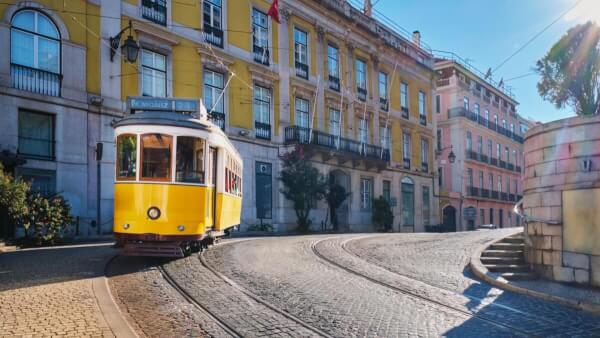Risks and pitfalls of buying property in Portugal
Read our guide on the pitfalls of buying property in Portugal and avoid the most common mistakes.

With its sunny climate, friendly people and relaxed pace of life, Portugal is a favourite among UK expats. Whether you're retiring, working remotely or just craving a change, Portugal makes it easy to feel at home abroad.
In this guide, we’ll explore what it’s like living in Portugal as an expat. We’ll look at healthcare, job opportunities, the cost of living and more.
We’ll also point out a cost-effective way to manage your money across borders from the money services provider Wise – the Wise account. It’s not a bank account but offers some similar features, and your money is safeguarded.
Over 14.8 million people worldwide use Wise to send, spend and convert money in 40+ currencies – for low, transparent fees* and no-markup exchange rates close to what you can see on Google. Plus, you’ll get dedicated support and volume discounts when sending large amounts.
Learn more about the Wise account ➡️
| Table of contents |
|---|
Let’s go through some quick facts about Portugal:
| Currency | Euro (EUR) |
|---|---|
| Main language | Portuguese |
| Population | 10,408,433¹ |
| Number of British expats | 47,409² |
| Popular expat destinations | Lisbon, Porto, Algarve region |
The cost of living in Portugal is considerably lower than in the UK, particularly when compared to major cities like London. From food and rent to utilities, everyday expenses are much more affordable.³
Here’s a look at what you can typically expect in terms of average costs in Portugal compared to the UK:
| 📚 Read more: Moving to Portugal from the UK: a complete how to guide |
|---|
Portugal offers a range of job opportunities for foreign workers, especially in tourism, hospitality, construction and call centers. Some roles require language skills, while others are suited to skilled professionals in areas like automotive repair or tech.⁴
To attract more international talent, the government launched Programa Integrar in 2024. This program helps bring in workers from abroad by offering training and support to help them settle. Portugal is also one of the few countries that offers a job seeker visa.⁴
Foreign workers now make up around 13% of Portugal’s workforce. Although many still face lower wages and less stable contracts, demand for international talent is growing, and more employers are open to hiring from abroad.⁴
The typical workweek in Portugal is still 40 hours over five days, but flexible hours and hybrid work are becoming more common, especially in cities like Lisbon and Porto. In smaller towns, you might still find businesses closing for a couple of hours in the afternoon.
Overall, the work culture is pretty balanced and people-focused, with a strong value placed on work-life balance.⁵
Portugal offers long-stay visas based on the purpose of your stay, such as study, internships, work or joining family. There is also a visa that allows foreign citizens to travel to Portugal specifically to look for work.
There are two main types of long-stay visas:
Temporary stay visas allow you to enter and stay in Portugal for less than a year. They cover your entire stay and usually allow multiple entries during that time.⁶
If you want to stay longer, you’ll need a residency visa, which permits two entries and is valid for four months. During this time, you must apply for a residency permit through the Portuguese immigration agency, AIMA (Agência para a Integração, Migrações e Asilo).⁶
One useful option is the job seeker visa, which allows you to enter Portugal specifically to look for work. Once you find a job, you can start working while your visa is valid, until you get your residence permit.⁶
The main work-related visas include those for employed positions, entrepreneurship, startups and digital nomads. Visa requirements vary depending on the type of visa you apply for.⁷
For example, to apply for a startup visa, you’ll need to provide a declaration from the Agency for Competition and Innovation (IAPMEI), which confirms that you have signed an incubation contract with a certified incubator, among other necessary documents.⁷
The ARI (Residence permit for investment), often called the Portugal Golden visa, allows non-EU investors to obtain a Portuguese residence permit by making qualifying investments for at least five years. You can invest personally or through a company with a permanent presence in Portugal. Once approved, you can live and work in Portugal, travel around the Schengen area, bring your family and later apply for permanent residency or even citizenship.⁸
Popular investment options include:
Get expert support for your large transfer 📞
The job seeker visa lets you enter Portugal to search for work. It is valid for 120 days and can be extended once for another 60 days.⁹
The visa allows only a single entry into the country and you must schedule an appointment with immigration services during the visa’s validity. If you secure a job contract in that time, you can apply for a residence permit, as long as you meet the general requirements.⁹
If your visa expires without finding a job or starting the residence process, you must leave Portugal. You will need to wait one year before applying for another job seeker visa.⁹
While the homeownership rate in Portugal is 70%, renting is usually the easier option for newcomers. You can rent directly from an owner, but it's recommended to work with an English-speaking real estate agent to ensure you're getting a fair deal.¹⁰
Some of the most popular destinations for expats renting in Portugal include Lisbon, Porto, Braga and the Algarve. Lisbon is both the largest and most expensive city, while the Algarve is a top choice for those seeking a picturesque seaside home.¹⁰
You’ll likely need to pay three months rent upfront, along with a security deposit or caução. Agency fees are usually covered by the property owner. Rental contracts are either fixed-term (contrato com prazo certo) or open-ended (contrato por duração indeterminada) and usually last for at least a year.¹⁰
To rent a house or apartment in Portugal, some of the most popular platforms include:
If you decide to buy property in Portugal, the good news is there are no restrictions for foreigners as long as you have a long-term visa and a tax number. You can even apply for a mortgage, though the terms may not be as favourable as those offered to locals. Real estate prices are around 20% lower than the EU average.¹¹
While living in Portugal as an expat, you’ll experience the country’s warm, welcoming culture. People value personal connections, and family is a central part of society. Mealtimes, especially lunch, are often unhurried social events. While this slower rhythm can be a welcome change, it may take some adjustment for newcomers used to a faster pace.¹²
Portugal, as an EU member, has a modern legal system and is widely regarded as a safe country. One example of the country’s legal requirements for expats is the need to register your UK driving licence with the Instituto da Mobilidade e dos Transportes (IMT) within 60 days of the date on your residence certificate, or immediately if you've already been in Portugal for more than 60 days.¹³
Portugal’s public healthcare system, the Serviço Nacional de Saúde (SNS), is publicly funded and provides universal cover. It’s available to residents, including expats with legal status. Most people pay subsidised fees for medical services, though care is free for children under 18 and adults over 65.¹⁴
SNS is similar in structure to the UK’s NHS, offering a wide range of services such as general medical care, specialist appointments, hospital treatment and emergency services. One key difference is that in Portugal, patients typically pay a small fee at the time of service, whether for a doctor’s visit or an ambulance service.¹⁴
Private healthcare is often a more practical choice if you’re living in Portugal as an expat. It’s generally affordable compared to other European countries, it offers quicker access to appointments and a wider range of services. It can also make it easier to see specialists, find English-speaking doctors and access dental care, often without the long waits of the public system.¹⁴
In Portugal, children must attend school from ages 6 to 18. Primary and secondary education are managed by the Ministry of Education (Ministério da Educação) while higher education including universities and polytechnics is overseen by the Ministry of Science, Technology and Higher Education (Ministério da Ciência, Tecnologia e Ensino Superior).¹⁵
Most Portuguese families choose public schools because they are free and offer good-quality education. However, since classes are taught in Portuguese, these schools may not be ideal for expat children.¹⁵
In secondary schools, students can choose vocational courses (cursos profissionais), which prepare them for careers in areas like IT, design or hospitality, or academic courses (cursos científico-humanísticos) covering subjects such as sciences, humanities and visual arts. Those interested in creative fields may also opt for specialised artistic courses (cursos artísticos especializados). If you choose a private British school, it will follow the UK curriculum.¹⁵
Portugal offers a variety of universities with diverse higher education programmes. Tuition is free for EU citizens and those living in Portugal as an expat for two years can also qualify for free higher education.¹⁶
Some of the top universities in Portugal are the following:
Living in Portugal as an expat brings many benefits, but like any country, it also comes with its challenges. Here’s a quick look at the main pros and cons of making Portugal your new home:
Pros:
Cons:
| 📚 Read more: How to open bank account in Portugal as a non-resident |
|---|
Sources used:
Sources last checked on date: 01-Oct-2025
*Please see terms of use and product availability for your region or visit Wise fees and pricing for the most up to date pricing and fee information.
This publication is provided for general information purposes and does not constitute legal, tax or other professional advice from Wise Payments Limited or its subsidiaries and its affiliates, and it is not intended as a substitute for obtaining advice from a financial advisor or any other professional.
We make no representations, warranties or guarantees, whether expressed or implied, that the content in the publication is accurate, complete or up to date.

Read our guide on the pitfalls of buying property in Portugal and avoid the most common mistakes.

Read our complete guide to the Portugal digital nomad visa (D8 visa), covering fees, documents, eligibility requirements and application process for 2025.

Read our guide on Portugal's healthcare as a UK expat. Learn about public and private options, costs, and more for a smooth transition to your new home.

Read our guide to Portugal Golden Visa for UK residents: a path to EU citizenship, Schengen travel, and more. Learn about investments and application steps.

Thinking of applying for a Portuguese passport? Read our guide on the Portugal citizenship by investment programme, featuring requirements, costs and benefits.

Read our helpful guide on how to transfer a UK pension to Portugal, including the steps, fees and taxes involved.